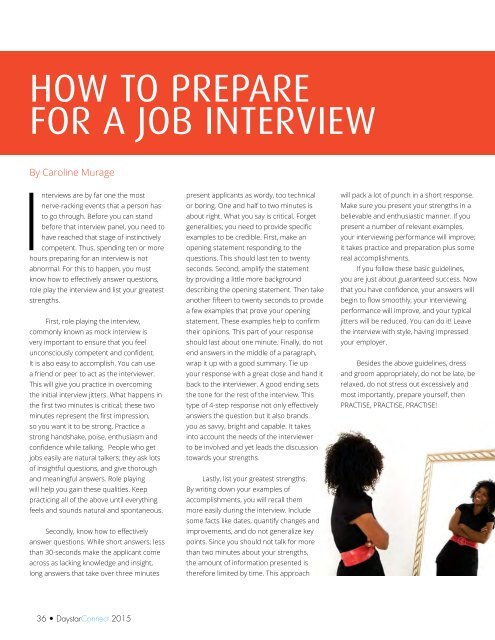our roots
Connect2015
Connect2015
Create successful ePaper yourself
Turn your PDF publications into a flip-book with our unique Google optimized e-Paper software.
How to Prepare<br />
for a Job Interview<br />
By Caroline Murage<br />
Interviews are by far one the most<br />
nerve-racking events that a person has<br />
to go through. Before you can stand<br />
before that interview panel, you need to<br />
have reached that stage of instinctively<br />
competent. Thus, spending ten or more<br />
h<strong>our</strong>s preparing for an interview is not<br />
abnormal. For this to happen, you must<br />
know how to effectively answer questions,<br />
role play the interview and list y<strong>our</strong> greatest<br />
strengths.<br />
First, role playing the interview,<br />
commonly known as mock interview is<br />
very important to ensure that you feel<br />
unconsciously competent and confident.<br />
It is also easy to accomplish. You can use<br />
a friend or peer to act as the interviewer.<br />
This will give you practice in overcoming<br />
the initial interview jitters. What happens in<br />
the first two minutes is critical; these two<br />
minutes represent the first impression,<br />
so you want it to be strong. Practice a<br />
strong handshake, poise, enthusiasm and<br />
confidence while talking. People who get<br />
jobs easily are natural talkers; they ask lots<br />
of insightful questions, and give thorough<br />
and meaningful answers. Role playing<br />
will help you gain these qualities. Keep<br />
practicing all of the above until everything<br />
feels and sounds natural and spontaneous.<br />
Secondly, know how to effectively<br />
answer questions. While short answers; less<br />
than 30-seconds make the applicant come<br />
across as lacking knowledge and insight,<br />
long answers that take over three minutes<br />
present applicants as wordy, too technical<br />
or boring. One and half to two minutes is<br />
about right. What you say is critical. Forget<br />
generalities; you need to provide specific<br />
examples to be credible. First, make an<br />
opening statement responding to the<br />
questions. This should last ten to twenty<br />
seconds. Second, amplify the statement<br />
by providing a little more background<br />
describing the opening statement. Then take<br />
another fifteen to twenty seconds to provide<br />
a few examples that prove y<strong>our</strong> opening<br />
statement. These examples help to confirm<br />
their opinions. This part of y<strong>our</strong> response<br />
should last about one minute. Finally, do not<br />
end answers in the middle of a paragraph,<br />
wrap it up with a good summary. Tie up<br />
y<strong>our</strong> response with a great close and hand it<br />
back to the interviewer. A good ending sets<br />
the tone for the rest of the interview. This<br />
type of 4-step response not only effectively<br />
answers the question but it also brands<br />
you as savvy, bright and capable. It takes<br />
into account the needs of the interviewer<br />
to be involved and yet leads the discussion<br />
towards y<strong>our</strong> strengths.<br />
Lastly, list y<strong>our</strong> greatest strengths.<br />
By writing down y<strong>our</strong> examples of<br />
accomplishments, you will recall them<br />
more easily during the interview. Include<br />
some facts like dates, quantify changes and<br />
improvements, and do not generalize key<br />
points. Since you should not talk for more<br />
than two minutes about y<strong>our</strong> strengths,<br />
the amount of information presented is<br />
therefore limited by time. This approach<br />
will pack a lot of punch in a short response.<br />
Make sure you present y<strong>our</strong> strengths in a<br />
believable and enthusiastic manner. If you<br />
present a number of relevant examples,<br />
y<strong>our</strong> interviewing performance will improve;<br />
it takes practice and preparation plus some<br />
real accomplishments.<br />
If you follow these basic guidelines,<br />
you are just about guaranteed success. Now<br />
that you have confidence, y<strong>our</strong> answers will<br />
begin to flow smoothly, y<strong>our</strong> interviewing<br />
performance will improve, and y<strong>our</strong> typical<br />
jitters will be reduced. You can do it! Leave<br />
the interview with style, having impressed<br />
y<strong>our</strong> employer.<br />
Besides the above guidelines, dress<br />
and groom appropriately, do not be late, be<br />
relaxed, do not stress out excessively and<br />
most importantly, prepare y<strong>our</strong>self, then<br />
PRACTISE, PRACTISE, PRACTISE!<br />
36 • DaystarConnect 2015


